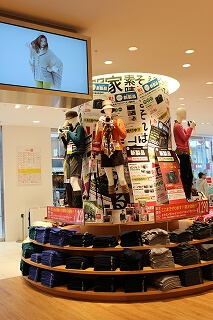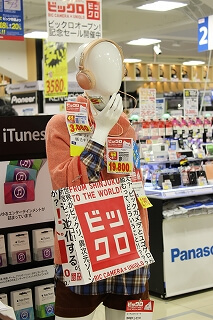Bicqlo Store Combines Clothes and Electronics to Boost Consumption
CONTENTS
Bicqlo Store Combines Clothes and Electronics
By Ryoji Shimada
“It’s a wonderful hodgepodge!” raves one sign. “Home appliances evolve, and so do clothes!” says another.
With such claims at the store front and eye-catching electronic bulletin boards displaying constantly updated information on products, one’s curiosity would naturally be piqued, and certainly expect to find something new and different inside.
“Bicqlo,” a new store that opened for business on September 27, is a collaboration between Bic Camera, a major electronics retail chain and Uniqlo, one of Japan’s largest marketers of casual apparel.

The press release from Bic Camera announced, “Combining the knowledge and experiences developed in both companies, we aim to make it a brand-new prominent sight in Tokyo that offers pleasure and surprise.”
Phonetically “Bicqlo” somehow suggests an association with the Japanese word bikkuri (surprise), which in this case seems to be a good match. Situated to the west of Tokyo’s Shinjuku station, Japan’s busiest commuter rail hub transited by over 3 million passengers pass every day, the store right from its opening attracted large numbers of customers.
Even during midday on a weekday, I found many customers, both young and old. And what’s more, I overheard enthusiastic remarks from customers such as, “Wow, interesting!” and “Take a look at this!” Not only the large number of customers but their fervor made for a lively and exciting ambience inside the shop.
“This new brand has begun to spread so quickly. Already we have been receiving plenty of attention in the market,” remarks Toru Murakami, store manager on the Uniqlo side. “People come here expecting something new and something that’s different from our ordinary stores. Their expectations are high.” Before the store’s opening, the company posted advertisements around the area and even masked one of the train cars with the store logo or hired chindonya to march through the neighborhood. (Chindonya are professional noisemakers traditionally used to promote newly opened stores, plays and the like. To get people’s attention they dress in an ostentatious way: even the men wear exaggerated make-up, colorful kimono and wigs in traditional Japanese hairstyles. They walk around shopping areas playing drums and gongs.)

Encourage customers to buy both home appliances and clothes
Management’s initial strategy seems to have paid off. With electronic bulletin boards inside and outside the store showing merchandise photos and their prices in a showy manner, the interior ambience is bright and stylish, certainly different from a conventional garment retailer. Even more interesting, the mannequins modeling Uniqlo clothes look out of the ordinary or perhaps more natural. One might be holding a camera and trying to shoot something, another might be wearing headphones and listening to an iPod, while others are relaxing in a massage chair in a light wear or pausing next to a set of golf clubs. All the outfits seem very suitable for using those commodities, making it easier for customers to imagine themselves in similar circumstances, what to wear on what occasion for example, and thereby creating a natural ambience.
“We would like to encourage customers to shop for both home appliances and clothes. They might come here with the intention of purchasing a camera, for instance, but end up buying clothes,” says Murakami.
At least customers all seem to be enjoying the store’s innovative and unique atmosphere. The point now is how to get them into a buying mood and keep bringing them back. “Making the utmost of this excellent location, we want our customers keep coming back. We have a long-term outlook and don’t want to end as a short-term sensation,” Murakami adds. “For that, we think we should create something fresh and exciting all the time.”
Collaboration leads to win-win for both companies
For the same goal, both of the two companies’ staff wear the same uniform, hear voices from customers and hold a joint meeting constantly to improve the operation and create something to attract customers. “We don’t have all the answers yet. We are still at the stage of trial and error,” notes Murakami.

But why do the two companies have to collaborate? The location is one of busiest and most popular districts in greater Tokyo, so attracting lots of customers shouldn’t be difficult. But at the press conference on September 11, President Miyajima of Bic Camera pointed out, “Customers are starting to come back gradually, but the overall market is still severe. With this collaboration, we aim to increase walk-in business.”
Since 2011, Japan’s home electronics market has been struggling with downturn in demand. One reason for this was that the phasing out of the government-subsidized “Eco-points system,” a 290-billion-yen program aimed at boosting consumer demand for energy-efficient home electronics products. Also demand for new TV sets declined sharply following the nationwide switchover to terrestrial digital TV broadcasting in July 2011. This new collaboration between the two firms, then, is an attempt to break out of the stagnation.
But it must be difficult to commit to memory the sales points of such diverse products, ranging from fashions to electronics, with which store staff are expected to be familiar when customers ask questions. And customers have no way to discern who on the sales floor is associated with which company, since they all wear identical uniforms.
“Yes, it is tough to do, and we are trying our best,” says Murakami with a wry expression on his face. “But it is a professional act to meet a demand from customers. If we are not sure about something, we don’t give an ambiguous response; we will call another sales staff member who’s familiar with the product and ask him or her to respond.” The shop employs around 480 staff from Uniqlo, of whom about 50 are non-Japanese who can respond to customer inquiries in English, Chinese and Korean. Many inbound tourists come to Japan and look for Japanese brand home appliances as well as Japanese fashions. Bicqlo affords a convenient place to meet the demand for both. Why don’t you come take a look? You may be pleasantly surprised.


